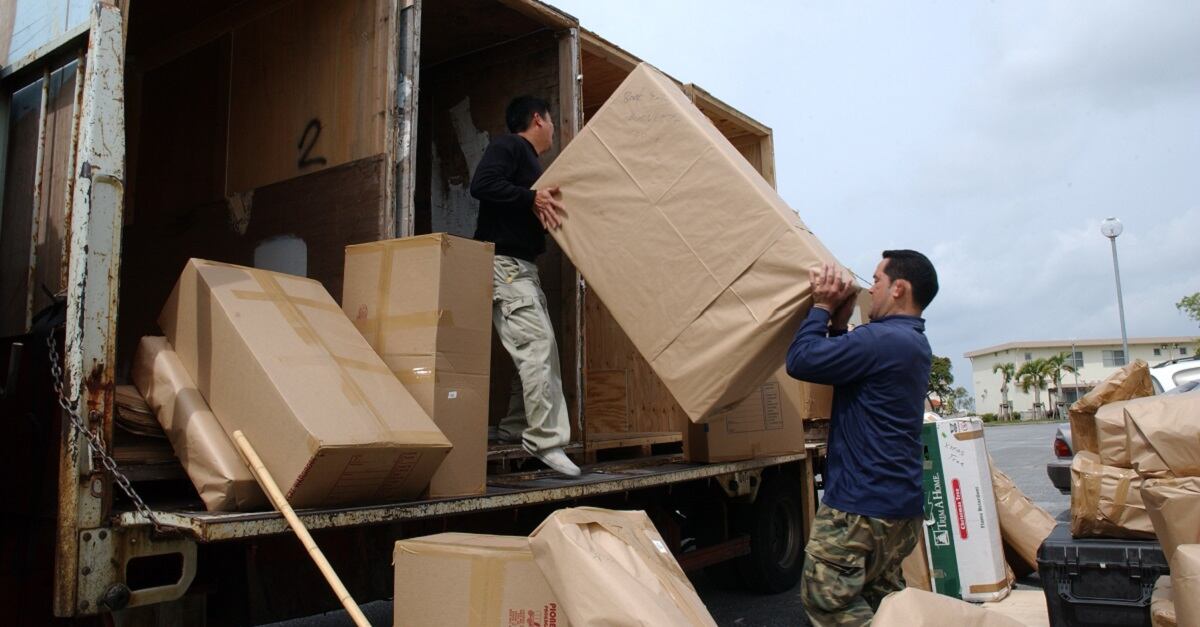The new $6.2 billion contract that’s supposed to improve the process for moving service members’ household goods has been delayed again — likely beyond next year’s peak moving season, officials said.
“It’s safe to say the majority of shipments will remain under the [current system]” during next year’s peak season, said Andy Dawson, director of the Defense Personal Property Management Office at U.S. Transportation Command, during a media roundtable Thursday. The delays are technology-related, officials said.
Meanwhile, new statistics give more clarity on the extent of troops’ and families’ problems with the current system. More than 800 companies handle approximately 170,000 shipments a year; some service members may have more than one shipment.
During this year’s summer peak moving season, the customer satisfaction rate was 74%, Dawson said. Year to date, the satisfaction rate is 78%. “That’s tens of thousands of service members and families that aren’t satisfied with their relocation experience,” Dawson said. “We owe it to them within the context of the existing environment, with recruiting and retention challenges, and high op tempo, to do everything we can to improve the quality of life that our service members and families deserve.”
The customer satisfaction rates are at least 20 percentage points lower than the rates reported in past years — generally above 90%. But TRANSCOM has implemented new analytics. “Over the last few years we’ve implemented program changes that allowed us to see ourselves better and we have confidence in those statistics,” Dawson said. Moving companies are no longer allowed to handle or disseminate customer satisfaction surveys. Service members are told they will get an email directly from the government with the survey.
Another telling statistic, Dawson said, relates to household goods claims for loss and damage. This year, to date, there has been a claims satisfaction rate of 41%.
RELATED

“We’ve shared those [statistics] with industry, and have been transparent that there’s drastic improvement needed,” Dawson said.
The contract is aimed at fixing military families’ long-standing problems with damaged household goods, and other frustrations with movers, and puts management of the moving process in the hands of HomeSafe, a consortium of private companies.
More testing will happen between now and the end of January. The new contractor, HomeSafe Alliance, will start moving a few service members in phases, but not until they’re satisfied with the interoperability between the Defense Department’s MilMove technology, and the contractor’s HomeSafe Connect technology.
Officials haven’t determined a date when the phased moves will start. “Our goal is to start shipments as soon as we meet the conditions required to successfully deliver and improve the experience of our service members and families,” Dawson said. Initially, the phased shipments were scheduled to start in September, then the timeline was moved to the end of the year, before this current delay.
“This next round of testing will allow us to have a better understanding of what additional work needs to be done to ensure interoperability between MilMove and HomeSafe Connect,” Dawson said.
Both systems are new technology. Service members will use MilMove to upload their Permanent Change of Station orders, share contact information and start the request for a new shipment. HomeSafe Connect will be used by service members, the government and industry to manage and track the shipment after it is sent from MilMove.
Because of the volume of moves during peak season — generally May through Labor Day — there are only eight months available for transformational changes, Dawson said.
“Moving in itself is stressful. We have to mitigate and lower the risk for service members,” he said. Behind the scenes the transition will continue, he said, “but customer-facing changes are tremendously hard to execute during that peak season period, so as a strategy to reduce the risk, we’ve taken that off the table.”
This new process consolidates all Defense Department household goods moves under a single contract, awarded to HomeSafe Alliance, a consortium of companies that will be the sole manager of household goods moves. The initial $6.2 billion contract is for three years, and the transition period has been extended.
The contract delay is not related to other aspects, such as the ability to get enough movers to sign on. There’s no target number for the number of companies, and officials said the contractor will bring in as many companies as needed. One member of that consortium is Sirva, which includes North American Van Lines and Allied Van Lines.
The current system is “highly inefficient,” Dawson said, and service members are primarily dependent on the internal processes of those 800 companies. HomeSafe will be fully responsible for these moves, bringing accountability to the program from the time a moving company is assigned, through the packing, hauling and unloading, and handling any claims for loss or damage. TRANSCOM is essentially outsourcing the management of the program through this contract, but will oversee the program.
When the phase-in of the new process begins, it will be limited to local shipments at a few locations — they’ll be tied to ZIP codes. For example, in the Norfolk area, they’ll be moving shipments within ZIP codes south of the Chesapeake Bay, not those on the peninsula.
The installations’ local transportation offices will continue to play a big role in this process, Dawson said, providing move counseling to service members, and performing other functions such as approving invoices.
Karen has covered military families, quality of life and consumer issues for Military Times for more than 30 years, and is co-author of a chapter on media coverage of military families in the book "A Battle Plan for Supporting Military Families." She previously worked for newspapers in Guam, Norfolk, Jacksonville, Fla., and Athens, Ga.




